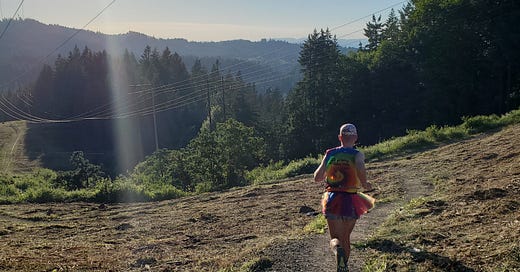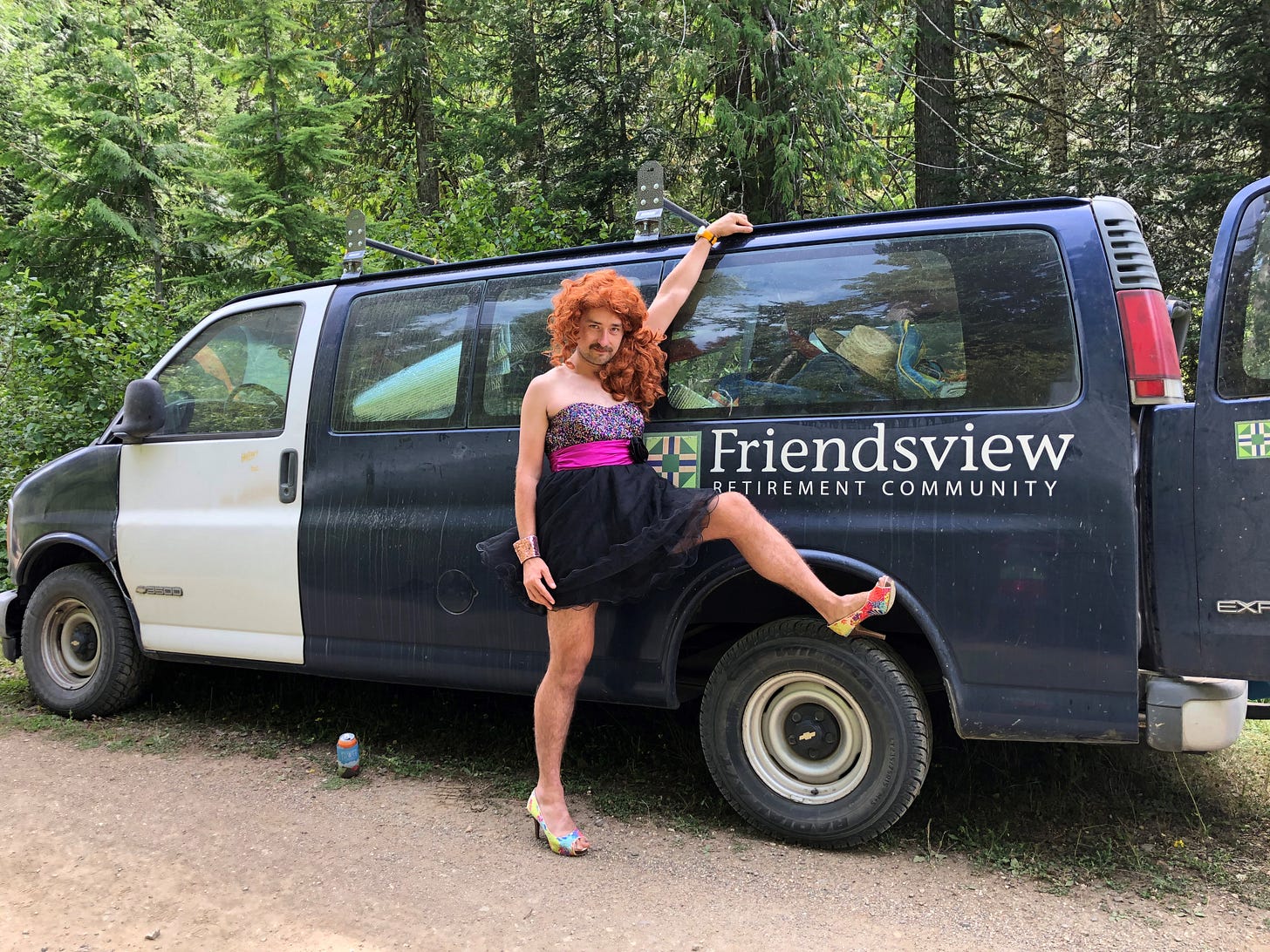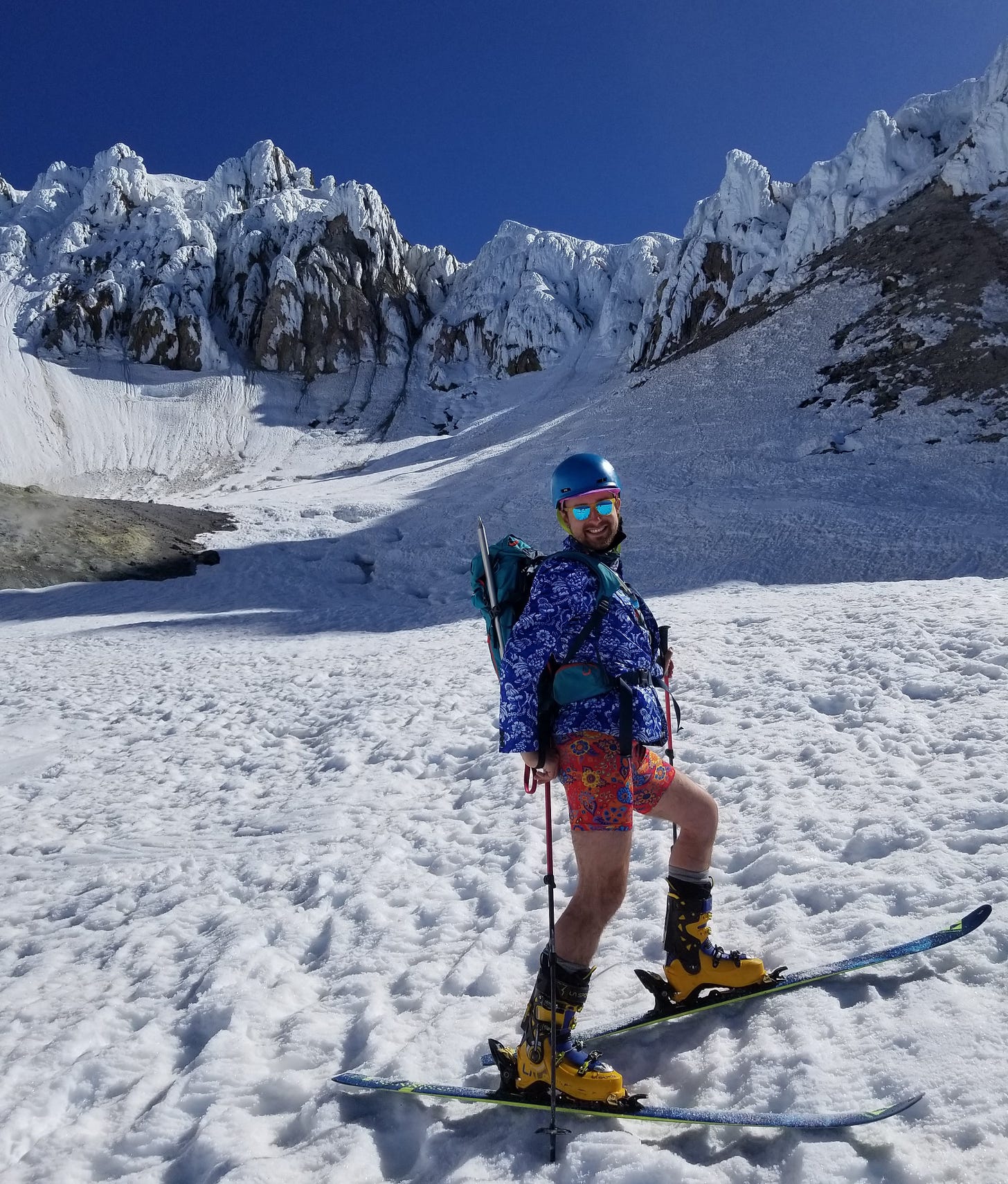
A big thanks to BOA for sponsoring Trail Mix this month. I started wearing BOA shorts a few years ago because they look so damn fun, but I soon discovered they’re really, really good at running, too. And now they’re my go-to shorts for long, short, and all-sized runs. And they’re giving you an awesome 25 percent off with the code BOATrailMix25.
BOA partnered with the Austin Frontrunners to design some fun and colorful gear to celebrate Pride (pictured below on my good pal Eli, who added some powerful words to this week’s Trail Mix.). BOA is donating 20 percent of these sales to the Hill Country Ride for AIDS.
Unbeknownst to me, the Eugene Police Department was staking out my house.
I discovered this when I was on my way to a yoga class and got pulled over and surrounded by a fleet of police cars in front of the natural foods store around the corner from my home.
I was certain that it was because I hadn’t put my new registration stickers on my license plate yet. But luckily, those stickers were sitting next to me on the passenger seat, in a still-sealed envelope from the DMV. I smiled. I was sure I could still make it to my yoga class on time.
The police officer walked over to my rolled-down window and before he could say anything, I proudly informed him that there was actually no issue at all.
“I bet you’re looking for stickers!” I cried. Victory punctuated my greeting. “I’ve got stickers right here!”
I pulled the envelope off my law-abiding-lululemon-covered-lap and thrust it through the window in his direction.
He looked at my hand and said nothing. His silence stretched on for an uncomfortable number of seconds.
“Stickers?” he said, in a slow, mocking drawl. He pulled out his wallet and opened it. “I’ve got stickers, too.”
He flicked a small piece of paper at me through the window. It landed smackdab on my luxury spandex. It was a sticker. A small police badge star, like you would give a small child to play cops and robbers.
He stared at me, without an ounce of a joke on his face.
I started to think maybe I was not going to make my yoga class.
The policeman started asking me lots of questions about my car. It was a navy blue Toyota Scion that I bought to move from DC to Oregon.
“Where did you get this car?” he sneered. The first of a rapid-fire series of questions.
“How much did you pay for it?” “Who sold it to you?” “Where’d you get those stickers?”
I stammered through most of my answers. The exact details of the purchase were fuzzy in my memory. It had been months since I bought it for my cross-country move. I was worried my nerves were making me seem guilty. I just had no idea what crime the officer thought I was guilty of.
But some point in the conversation, I realized the car must be a stolen vehicle – and that this policeman suspected I was the villain, not the victim.
As I fumbled my way through his aggressive line of questioning, the officer interrupted me and told me I was lucky I wasn’t face-down on the ground, surrounded by a group of policemen with guns aimed in my direction.
Which was a real jerk thing to say. But he was right, I was incredibly lucky.
After he realized I wasn’t guilty and just really bad at buying cars, I was escorted back to my home by a much nicer officer and he allowed to remove my belongings from the car before he confiscated it.
But I didn’t end up on the ground. No guns were pointed at me. I wasn’t arrested. I was fine – outside of being unexpectedly carless and missing one round of vinyasas.
I’ve thought a lot about just how lucky I was on that Saturday morning several years ago. And I’ve thought a lot about how much worse that whole thing could’ve gone, especially if I were not a white woman on my way to yoga class. Dressed in lululemon capris and pulled over in front of my favorite place to buy kombucha and kale.
But at the time, I didn’t think much about that – which is a shining example of white privilege in action. And a glaring sign that I was being ignorant to the social injustices that plague so many lives that are not my own. It was clear I had some learning to do.
When our run last weekend went sideways and we were stranded on the side of the highway trying to decide how to get to our destination, I suggested we try hitchhiking.
“It’s a busy road!” I said. “I’m sure someone will pick us up!”
My friend Eli seemed less excited about the idea. So, I eventually dropped it. And didn’t question why he was reluctant to attempt the thumbs-out strategy.
But, I realized later how insensitive my suggestion was. We were in rural Oregon and Eli is a gay man, who was dressed in his standard running apparel, which is not what anyone would describe as standard masculine attire.
I would describe his typical colorful/sparkly/volume-turned-up-to-an-11 kind of gear as “fucking awesome,” “fit for a QUEEN” and “hotter than a Robyn concert.” But I know it’s also a look that has made Eli feel very uncomfortable and unsafe when hanging out in areas with a higher density of homophobic individuals – like the area we were running through on our grand misadventure.
Eli’s spent a lot of time in rural areas for fun and for his work “fixing rivers.” And they haven't been safe or welcoming spaces for him. He’s faced many really scary and sad interactions that have left him fearing violence and hate because of the fact that he’s a fabulously proud gay man.
Eli will tell you there are lots of good reasons he still wants to dress like a queen while running and adventuring.
“Technical gear and typical cis-het wyt mountain apparel can act as a gate keeper for folx to enter outdoor sports,” Eli told me.
“And she feels like herself in these outfits. It’s important to not let the fear of backlash from horrible people stifle authentic self-expression. Plus, representation and visibility are so important. Hopefully by being the most fabulous queen on the trail, other folx can feel like they can express themselves and participate in the sport, too.”
But sometimes he just has to hide the flashiest and most beautiful parts of himself to avoid being a target for hate. When we lived together, he left our home for work every morning in flannel and earth tones in an effort to camouflage himself in the rural community that he worked in.
It made a lot of sense that he was uneasy with the idea of hitching a ride that day. But the fact that I didn’t consider that was another shining example of my privilege blinding me to someone else’s hard reality.
Later that week, we met up to do hill repeats together and we started talking about that run – and about how challenging it is to be gay in the outdoors.
“I realized after our run that you probably didn’t feel as safe trying to hitchhike, huh?” I asked. We were doing hill repeats on one of the steepest trails in Eugene. Sweat was pooling down my spine as I talked.
“It’s something I think about any time I consider hitchhiking,” he said. Eli is generally a very jovial running partner, but his tone dropped to a very serious note. “Just like every time I pump gas in a rural area I think of Matthew Shepard.”
My heart dropped. I care so deeply about Eli and while I know this is his reality, it’s hard to sit with how much hate and fear he’s subjected to. Which, of course, is so much easier than actually living with it.
Eli works – and plays – so hard to increase representation in outdoor spaces and make them feel inviting to the gay community. He skis in sequins, and runs in gold booty shorts, and struts around trailheads in long gowns and high heels and a sloppy blonde wig, trying to carve out a space for queer folx to feel safe expressing the truest versions of themselves when they’re outside and doing the things they love.
He inspires me to think a lot harder about what I can do to help create that change. So I asked him if he would be willing to talk about what it looks like to be a good ally in his life. Things like the whole hitchhiking snafu remind me that I’ve still got work to do.
“I want people in my life to consider what it’s like to be a gay man in overwhelmingly straight spaces. And think about how it feels to be the only queer person out in the mountains,” he said.
“And I want my friends to think about when I might feel unsafe or uncomfortable and talk to me about it. I want people to see me—the whole womanifestation of myself, that I’m not just a jovial silly gay on the trail and in the mountains, but that when my friends are gone and I’m by myself in those spaces there’s a lot of fear and a lot of checks I have to do for myself to ensure that I’m safe. I need my friends and co-conspirators to truly see that side of my lived experience too. You can’t just take the silly dresses on the slopes and trails, you need to also show up and understand the consequences that I face for being myself. When I’m alone in those spaces, I sit with Matthew Shepherd, I think of my safety and I deal with internalized homophobia. I need my allies to see that part of me, and check in with me about that— which takes more effort than it may to be friends with someone just like yourself. Allyship takes energy and thoughtfulness, it’s not easy.”
He recalled another long run we’d been on together, in a different rural area, where we stumbled upon a group of men shooting guns for fun in the woods. Eli was wearing bright rainbow shorts and a cutout tank with a picture of a kitten riding a rainbow. He looked beautiful.
The situation made me very uncomfortable. I don’t love being up close and personal with firearms. And my gut was signaling that this wasn’t the friendliest group of men. But as we were moving past them, I realized how much more uncomfortable Eli probably was – I know how threatened he can feel when he’s not hiding the flashy parts of himself that make him stand out. So, I asked him about it when we were alone on the trail again.
“That was a form of allyship that I really appreciated, I’ve used it as an example of how you can check in with your friends outside to make sure they’re safe.” he told me as we kept huffing oxygen and hiking uphill.
We crested the summit and started running down the trail together. The sun was glowing as it sank into the horizon. We ran in silence for several strides and I thought about all of the runs we’ve been on together and wondered what other times I’ve been ignorant to Eli’s experience as a gay man. I'm sure there are other glaring signs that I have more learning to do.
I watched Eli running ahead of me in a rainbow tutu and a bright tie-dye tank. A true queen of the hill.
He was such a beautiful sight on the trail. A sight that the outdoors needs a lot more of – and that I want to work harder to see.
If you dig Trail Mix or a story resonates with you or makes you laugh or cry or laugh-cry and you want to say “hey thanks for typing these words and sharing them on the internet,” you can buy me a coffee (or beer!). I can’t thank you enough for supporting this little storyletter.
There are also monthly membership options if you want to support Trail Mix with a regular coffee or beer. I love connecting with folks through these stories and want to keep writing and sharing every week and your support helps me do that! Big, big cheers and thanks for supporting Trail Mix in whatever way you can - through coffees, and notes, and letting it land in your inbox, and sharing it with friends. I am so grateful for any and all of your Trail Mix-ing!
You can share Trail Mix with friends (real life or internet ones). (Link to webpage here!) You can also send me notes about Trail Mix-y things through email, comments, instagram or twitter.
💜🌈And follow Eli for more stories about life as a gay trail runner and mountain athlete! He's currently training for his first 100 miler(!) and raising money for the Inclusive Outdoors Project to help make the outdoors more accessible to queer and BIPOC folks. It's a fantastic cause to support if you're able. 🌈💜
Trail Mix is a weekly newsletter full of stories about running and life, dispatches from the wilderness, and essays about how it all collides. You can subscribe to Trail Mix for more stories in your inbox.











